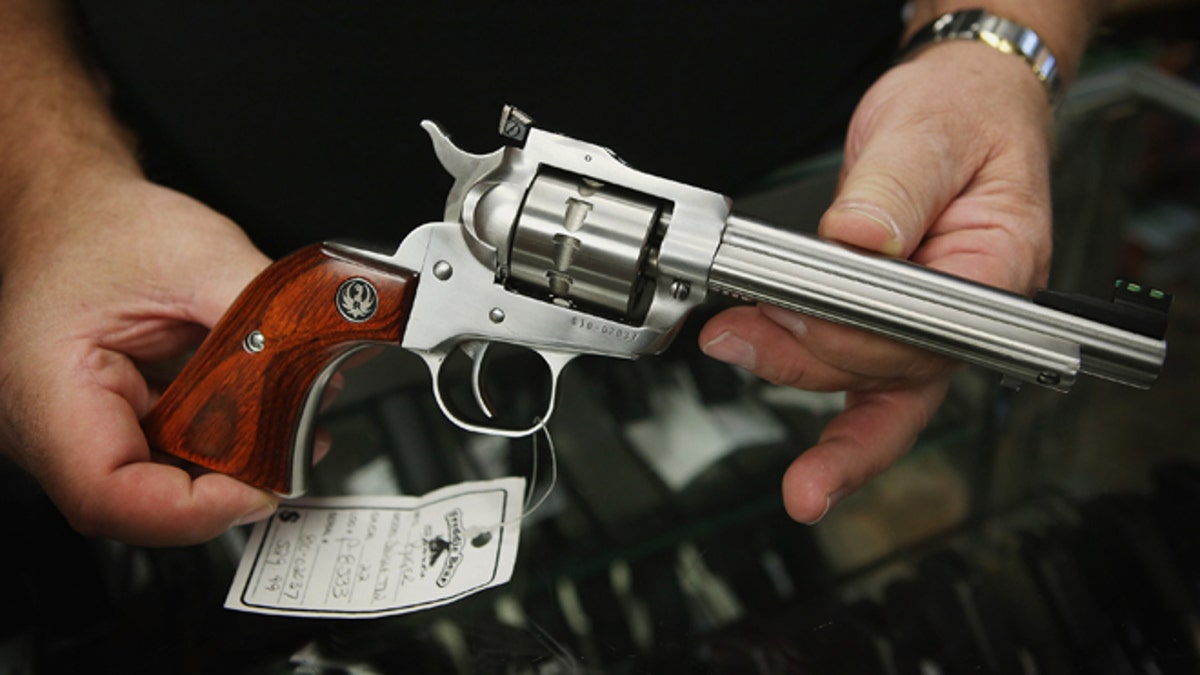
TINLEY PARK, IL - OCTOBER 18: Fred Lutger, owner of Freddie Bear Sports, shows a Ruger Single Ten .22 caliber revolver being offered for sale at his store on October 18, 2012 in Tinley Park, Illinois. Facing a $267.5 million fiscal 2013 budget gap, Cook County, which includes the City of Chicago and suburbs, has proposed a tax of 5 cents per bullet and $25 on each firearm sold at gun and sporting goods stores in the county. Lutger, who has owned Freddie Bear Sports for 35 years, is concerned with the impact the tax will have on his store which is located about 2 miles inside the Cook County line. (Photo by Scott Olson/Getty Images) (2012 Getty Images)
With leaders in Washington putting gun control as their top domestic agenda in the wake of December's mass shooting at a Connecticut elementary school, data suggests that Latinos are one group that overwhelmingly prefers stricter laws on firearms.
According to a 2012 study by the Pew Research Center, only 29 percent of Latinos view protecting gun ownership rights as very important, compared to 57 percent of whites.
“Latinos clearly place a priority on gun safety and prefer measures that make the gun sale laws stricter,” said Joshua Ulibarri, a partner at Lake Research Partners, a public opinion research firm.
A 2011 survey by Lake Research for the Mayors Against Illegal Guns Coalition found that 86 percent of Latinos support mandating a background check for all gun buyers. Background checks, however, are favored not only by anti-gun activists but also by the National Rifle Association (NRA).
The NRA did not respond to requests for comment.
There are a number of theories to why Latinos are more likely to favor stricter gun control laws than whites or African-Americans. One is that many Latino immigrants come from countries with high rates of violent and another is that Hispanics – along with African-Americans – experience a disproportionate amount of gun violence in the U.S. compared with whites.
“The gun crime issue could play into it,” said Robert Cottrol, a professor at George Washington University Law School. “Although if you live in a high-crime neighborhood, it also might make someone want to own their own gun.”
The rural vs. urban divide is probably the best indicator of where you stand on gun control.
Experts say that the longer a group lives in the United States the less likely they are to favor gun control legislation. Groups like the Scotch-Irish, who have lived in the United States for centuries, favor looser gun laws, while recent immigrants from Latin America overall want stricter gun control, Cottrol added.
But someone's gun control stance is most likely decided not by ethnicity or even political ideology, but by where he or she lives, he said.
Many Democratic lawmakers from rural states face the tricky issue of negotiating their own party's stance of tighter gun control with that of their constituents in areas where gun ownership is more a rule than an exception.
For example, Democratic senators such as Mary Landrieu of Louisiana, Max Baucus of Montana, Tim Johnson of South Dakota, and Jay Rockefeller of West Virginia all represent rural districts where hunting is a popular pastime and gun ownership is the norm.
In South Dakota, almost 57 percent of citizens reported owning at least one firearm, according to the Washington Post.
According to the most recent data by the FBI, there are more than 159 million owners of firearms who applied for a background check between 1998 and 2012.
“The rural vs. urban divide is probably the best indicator of where you stand on gun control,” Cottrol said.
During a meeting Thursday, Vice President Joe Biden said he would give President Barack Obama a set of recommendations on gun control by next Tuesday. The NRA, one of the pro-gun groups that met with Biden during the day, rejected the effort to limit ammunition and dug in on its opposition to an assault weapons ban, which Obama has previously said he will propose to Congress.
"The vice president made it clear, made it explicitly clear, that the president had already made up his mind on those issues," NRA president David Keene said following the meeting. "We made it clear that we disagree with them."
Opposition from the well-funded and politically powerful NRA underscores the challenges that await the White House if it seeks congressional approval for limiting guns and ammunition and greatly expanding background checks. Obama can use his executive powers to act alone on some gun measures, but his options on the proposals opposed by the NRA are limited without Congress' cooperation.
Obama has pushed reducing gun violence to the top of his domestic agenda following last month's massacre of 20 children and six adults at a Connecticut elementary school. The president put Biden in charge of an administration-wide task force and set a late January deadline for proposals.
"I committed to him I'd have these recommendations to him by Tuesday," Biden said Thursday, during a separate White House meeting with sportsmen and wildlife groups. "It doesn't mean it's the end of the discussion, but the public wants us to act."
The Associated Press contributed to this report.








































